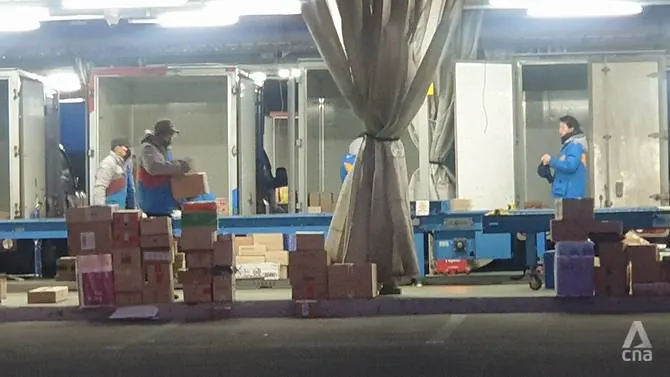South Korea's deadly parcels: Delivery workers suffer brunt of pandemic boom
09 March, 2021

It's 5.30 in the morning.
Most of South Korea is still asleep but a logistics hub in Bucheon city near Seoul is already buzzing with activity.
Delivery workers are sorting thousands of parcels, organising them by addresses to which these same workers will send the parcels later in the day.
It's arduous work - a necessary part of the job - but the delivery workers call these three to four hours they spend every day "free labour". They only start earning when the parcels are sent to their designated addresses.
Kwon Doo-seon, who has done this for almost 10 years, says he and his colleagues make an average of US$0.60 for every parcel delivered.
"That's why we were striking and holding protest rallies," says Mr Kwon. "We want other people to do the sorting. We spend hours doing that and we don't earn anything."
Most deliveries in South Korea are handled by large logistics companies. They outsource the work through independent agents or middlemen to delivery workers like Mr Kwon, who are considered subcontractors working on commission using their own vehicles.
Under South Korea's labour laws, a 52-hour work week is the limit, a cap that does not apply to subcontractors like Mr Kwon.
"I used to work an average of 10 hours day. But since the COVID-19 pandemic last year, 12 hours has become the norm," he laments. "The pandemic has changed our lives."
Tuesdays - with around 400 parcels delivered - used to be the busiest, says Mr Kwon. But now, he averages 500 to 600 every day.
"BULLET SPEED" DELIVERY
It's a trend that's been observed in many other countries. COVID-19 restrictions and the fear of infection have driven more consumers, including those in South Korea, to shop online.
South Korean government data puts the number of parcels delivered last year at 3.37 billion, up 21 per cent from the year before.
On top of increased volumes, logistics companies vying for business are promising ever quicker delivery times. Coupang, an up-and-coming online retailer, is winning over customers by promising "bullet speed" services - deliveries made before midnight that arrive the next day by 7am.
But Coupang and other logistics companies have come under the spotlight, accused of harsh working conditions that have allegedly led to the deaths of several workers.
"DEATH BY OVERWORK"
The Japanese term "karoshi" is one of those that has worked its way, unnervingly, into modern parlance. It means "death by overwork".
The South Korean equivalent is "gwarosa".
"At night when I am sleeping, my wife sometimes comes very close to me and see if I am breathing or not," Mr Kwon says, adding that he is not surprised more people have died from "gwarosa" as the workload has become unbearable since the pandemic began.
Jang Duek-jun was just 27 when he died last year. His parents are still coming to terms with it.
"Who would believe that a young boy who was healthy, did not smoke or drink, would die of 'gwarosa'?" asks his father. "All he did was really sleep after work. Get up and go to work. Who would think this could happen to him?"
On Oct 12, 2020, their son arrived home, like he always did, after an overnight shift at the warehouse of Coupang, the online retailer. He went to take a shower.
His parents later found him dead face down in the bathroom.
The mother of Jang Deuk-jun at the columbarium. Her son died at the age of 27. He had worked an overnight shift at the warehouse of online retailer Coupang. (Photo: Lim Yun Suk)
Coupang denied the young man was overworked. But the state-run Korea Workers' Compensation and Welfare Services recently said that his death was work-related.
FIGHTING FOR CHANGE
Government data shows that one to four couriers died every year between 2015 and 2019. But in 2020 nine of them died in the first half of the year alone. Full-year figures will be released later this month.
Statistics like these and increasing media coverage of the plight of delivery workers have garnered sympathy.
Customers have become more understanding of these frazzled delivery workers. Some have written notes telling the workers it is all right to be late. Other have left beverages outside their doors.
"I think it's okay for us to wait for a few days for goods we don't need urgently," one female office worker in Seoul told this reporter. "I don't want delivery workers dying because of us."
In August the labour ministry urged the major logistics companies to hire more people so delivery workers can get enough rest and to ensure workers did not have to work continuously overnight.
But Kim Tae-wan, who heads the union of delivery workers across the country, says little has changed.
"Workers are not receiving all the benefits that they are supposed to. They are not being protected under the labour law. Many still work under conditions that are bad and primitive," he says.
"Workers who sweat and toil should be paid. They should be able to live a happy life with their families."
Source:
TAG(s):
